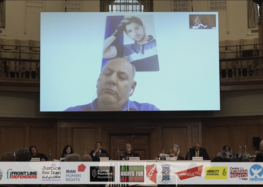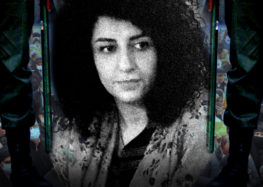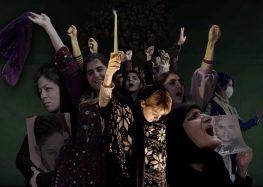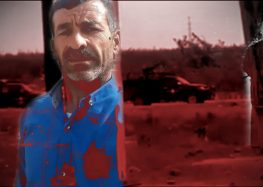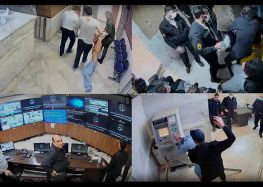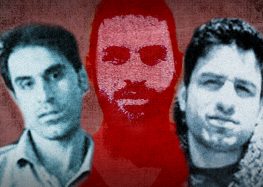Relatives of Victims of State Violence are Being Persecuted in Iran
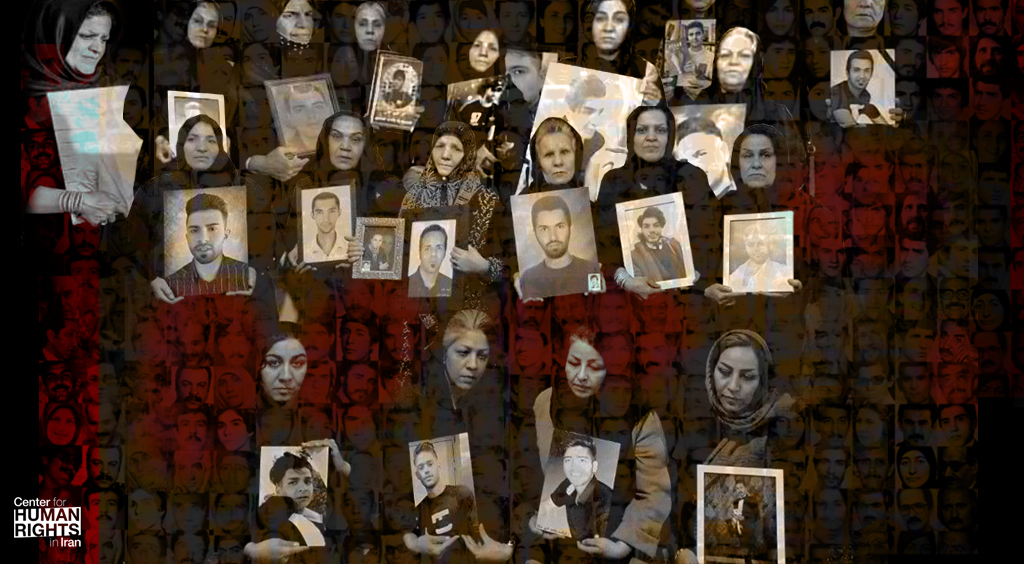 Justice-Seeking Families Face Harassment, Manufactured Prosecutions
Justice-Seeking Families Face Harassment, Manufactured Prosecutions
The government of President Ebrahim Raisi should end the state’s campaign of harassment and intimidation against the families of victims of state violence, including those who died during street protests.
As shown in the following list of examples compiled by the Center for Human Rights in Iran (CHRI), which is not exhaustive, bereaved families in Iran are facing reprisals for seeking investigations into their loved ones’ deaths and for demanding justice.
Instead of being allowed to grieve and publicly honor their loved ones, state intelligence and security agents are harassing family members, including by: summoning relatives to warn them against engaging in public gatherings and activities, arresting them without just cause, and seeking convictions against them in trials sorely lacking in internationally upheld standards of due process.
Following is an incomplete listing of some recent examples of grieving family members being denied the right to mourn and seek justice in Iran.
The Afkari Family
In September 2020, Navid Afkari, a 27-year-old champion wrestler, was unjustly executed in Shiraz, Fars Province for alleged murder after a trial that denied him internationally upheld standards of due process.
Two of his brothers were also imprisoned without due process in connection with the same case.
In early March 2022, Habib Afkari was released after three years in prison, including more than 550 days in solitary confinement. Vahid Afkari is still in solitary confinement.
After being freed, Habib Afkari took to Twitter to describe the details of the miscarriage of justice that led to his brother’s execution, as well as the physical and psychological torture Habib and Vahid Afkari endured in state custody.
Their family members have also reported being harassed and abused by state security agents, including:
- In December 2020, two months after Navid Afkari’s execution, his mother and father were detained for trying to place a gravestone on their son’s grave. They were interrogated for hours and ordered not to make any further attempts to mark the grave.
- In June 2021, when the youngest Afkari brother, Saeed, along with his sister, Elham, and their parents and aunts were protesting in front of Adelabad Prison in Shiraz to demand an end to Habib and Vahid’s solitary confinement, state security agents attacked and beat them.
- In September 2021, Saeid and Elham Afkari were beaten and detained as they were traveling to Adelabad Prison to visit their brothers on the anniversary of Navid’s execution.
- In October 2021, to mark Cyrus Day in honor of the pre-Islamic Persian king, the Afkari parents were detained by state security forces, who confiscated posters of Navid Afkari.
The Ansarifar Family
Farzad Ansarifar, 27, was killed in November 2019 by a bullet fired by the police in Behbahan, southern Iran, as he stood on a side street watching from afar as people protested over the sudden rise in gasoline prices. His family immediately pressed for an investigation to identify and prosecute the killer, but were instead met with harassment by the judicial and security establishment.
Farzad’s sister, Farzaneh, was the first member of the family to be harassed and prosecuted for seeking justice. In July 2020, she was arrested and held for eight days for participating in a gathering condemning the harsh punishments meted out against people accused of protesting Iran’s dire economic conditions.
During this time, her car was set on fire. Yet she continued to seek justice for her brother and was ultimately charged with “propaganda against the state,” “inciting the general public” and “giving interviews to foreign media” in November 2021.
In addition, Farzaneh Ansarifar was summoned several times to appear in court on bogus charges brought by Behbahan’s former police special forces commander, Rahman Badri. The charges included “stealing an elevator,” “deliberate assault,” “publishing provocative photos,” “insulting the Supreme Leader,” “writing slogans”, and “participation in November 2019 protests.”
In February 2022, she was sentenced to 4.5 years in prison by Branch 1 of the Revolutionary Court in Bandar Mahshahr, southern Iran, on the charges of “assembly and collusion against national security” and “propaganda against the state” for her participation in anti-state protests in November 2019.
Other family members were also persecuted.
In November 2021, Amin Ansarifar, Farzad Ansarifar’s father, provided testimony about his son’s killing at the Iran Atrocities (Aban) Tribunal in London, which was established by three NGOs to gather evidence of Iranian authorities’ violent repression of the country’s November 2019 protests.
Subsequently, Amin and his son Arman were summoned to court to face charges of “propaganda against the state.” When Amin appeared at the Revolutionary Court in Behbahan in February 2022, he was taken into custody. The following day, Arman was also arrested and taken to the city’s Intelligence Ministry detention center.
When Farzaneh went to the Behbahan prosecutor’s office on February 21 to make inquiries about her father and brother’s arrest, she was reportedly physically assaulted and threatened with arrest.
Amin and Arman Ansarifar were released on bail on March 16, 2022.
The Bakhtiari Family
Pouya Bakhtiari (also spelled Bakhtyari), a 27-year-old from Karaj, west of Tehran, was killed by a bullet to the head as security forces opened fire on protesters in November 2019.
Since then, his mother, Nahid Shirpisheh, and father, Manouchehr Bakhtiari have come under severe pressure from the judicial and security establishment for trying to keep their son’s memory alive, including through social media posts and by speaking to Persian-language channels based abroad.
In late December 2019, the parents were summoned to the Intelligence Ministry’s office in the city of Karaj and warned not to hold a ceremony at Pouya’s grave to mark the 40th day of his death. The family decided to honor Pouya anyway, and on December 23 both parents and several other family members were detained by state security forces.
Hours before his arrest, Manouchehr Bakhtiari told the Center for Human Rights in Iran that during the span of one week, he had twice been summoned to the Intelligence Ministry’s office in Karaj and to the prosecutor’s office on two other occasions, where local authorities pressured him to call off the memorial service.
In May 2020, Manouchehr wrote a letter, addressing international human rights officials including the UN High Commissioner for Human Rights Michelle Bachelet, calling for pressure on Iranian authorities and to hold them accountable for killing protesters.
In June 2020, Manouchehr posted a video message saying he and his brother, Mehrdad Bakhtiari, were coerced by the authorities to participate in an event honoring Islamic Revolutionary Guard Corps Commander Qasem Soleimani, following his assassination in Iraq.
On July 13, Manouchehr was arrested by state security forces during a trip to Iran’s Kish Island in the Persian Gulf. On August 25, several of his family members held a protest rally in front of the Interior Ministry in Tehran demanding Manouchehr’s release. The police violently intervened and arrested Bibi-Zahra Bakhtiari, Manouchehr’s 80-year-old mother, and held her for several hours.
In a video posted online on November 2, Bibi-Zahra said her other son, Mehrdad, had also been taken into custody by state security forces.
Manouchehr was released on bail on December 5. His brother Mehrdad was freed on December 17 after being slapped with a suspended five-year prison sentence and a two-year ban on traveling abroad.
On April 7, 2021, Manouchehr and several relatives of the victims of the November 2019 protests were detained for several hours for participating in a rally honoring As’ad Bakhtiari, a leading player in Iran’s 1906 Constitutional Revolution.
A few weeks later, on April 29, security forces stormed Manouchehr’s home in Karaj and violently arrested him. In mid-July 2021, he contacted his family from the Central Prison in Karaj to say he had been sentenced to 3.5 years in prison, 2.5 years in exile (beginning after his imprisonment), and had been banned from leaving the country for two years.
In an audio message from prison posted online on July 16, 2021, Manouchehr said he was denied legal counsel and had not been informed of his court sessions, which blocked his ability to provide a defense.
In a video message published on September 13, 2021, Manouchehr’s wife, Nahid Shirpisheh, said four security agents entered her home, searched the building, and confiscated her mobile phone.
In a letter from prison, read by his brother Mehrdad and posted online on January 14, 2022, Manouchehr announced he had started a hunger strike to protest being transferred into solitary confinement.
Addressing the state prosecutor in Karaj, Manouchehr wrote: “… I have been [imprisoned] because in the Islamic Republic, seeking justice is a crime and cries for justice must be silenced…”
“Without being informed of the charges, or the date of the trial, or having access to a lawyer, the judge sentenced me to 3.5 years in prison to extinguish a father’s cries for justice [for his fallen son.] However, those who ordered and carried out this crime should rest assured that in the near future they will be put on trial by a court set up by the Iranian nation and punished for their deed,” he added.
New Year, Ongoing Harassment and Resistance
On March 26, 2022, mothers of November 2019 protest victims Pouya Bakhtiari, Vahid Damvar, and Ebrahim Ketabdar, along with the mother of executed wrestler Navid Afkari, gathered around the grave of Amir Alvandi Mehr, also killed during the November 2019 protests in Shiraz, and pledged to continue the struggle to seek justice for their loved ones.
Previously, after the Iranian new year on March 21, 2022, relatives of several victims of state violence had taken to the street and handed out flowers to the public in memory of their lost loved ones: Mahboubeh Ramezani, the mother of Pejman Gholipour, one of the victims of the November 2019 protests; Behieh Namjoo, the mother of executed wrestler Navid Afkari; the mother (name unknown) of Saro Ghahremani, a protester who died in state custody in January 2018; and the parents of Amir-Hossein Zarezadeh, another victim of the November 2019 protests.
In Sanandaj, the capital of Iran’s Kurdistan Province, the mother of executed political activist Ramin Hossein Panahi also handed out flowers in honor of her son among the people taking part in new year celebrations.
Read this article in Persian

